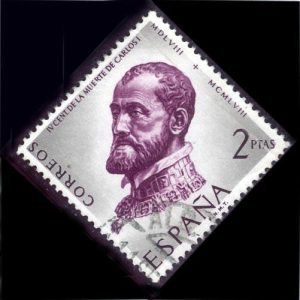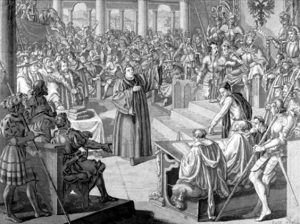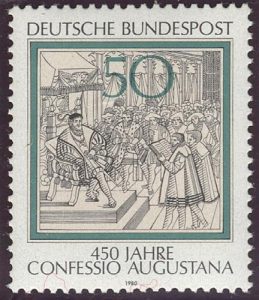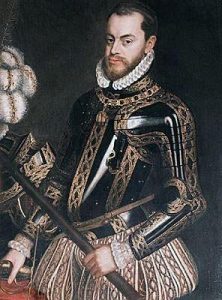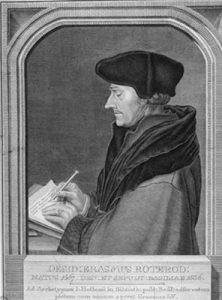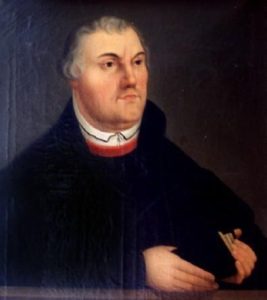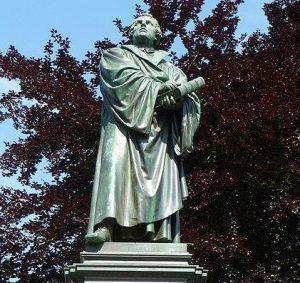Charles the Emperor
Charles of Habsburg was born in Ghent in 1500. He inherited:
- First, the Duchy of Burgundy, together with its possessions in Flanders at the death of his father in 1506,
- Then, the kingdoms of Castile, Aragon, Naples and Sicily at the death of his maternal grandfather Ferdinand V in 1516,
- And finally, the Archduchy of Austria in 1519 at the death of his paternal grandfather, the Holy Roman Emperor Maximilian.
In 1519, after a manipulation of the votes, he was elected as Charles the Fifth, Emperor of the Holy Roman Empire, in opposition to his rival Francis I of France.
He then governed an immense territory which included the Spanish colonies in Mexico and South America, on which “the sun never sets.” In 1526, he married his first cousin Isabella of Portugal and was crowned Emperor by the Pope in 1530.
Charles the Fifth and Luther
The powerful influence of the Reformation Movement was felt especially during Charles’ reign as Emperor.
The Emperor was dedicated to defending the catholic faith. First of all, he called Luther to the Diet of Worms in 1521; he was outlawed from the Empire but was given safe conduct to return to his home, as had previously been promised.
In these troubled times, when the Reformation Movement was gathering impetus, the German princes decided to fight for the autonomy of their States, while the peasants seized the opportunity to rise in rebellion.
Charles the Fifth and the protestant princes
In 1530, Charles called the Diet of Augsbourg in order to put an end to the problems of religious strife. The German princes presented him with the Confession of Augsbourg, drawn up by Melanchthon, but he felt he could not accept it.
The princes in the north of Germany who had been won over by the Reformation set up the Schmalkaldic League in 1531 with, at its head, Philip of Hesse, an ally of Francis I of France. Charles the Fifth ordered them to return to episcopal jurisdiction and give back the possessions of the Church, but without success.
The council of Trent opened in 1545, but the protestants refused to attend so Charles the Fifth and the Pope, with three armies, attacked the princes, who were defeated in Mühlberg in 1547; they were forced to accept the Augsbourg Interim in 1548 until the decisions of the Council of Trent would rectify the situation; in the meantime, protestants were provisionally allowed to take full communion (with both bread and wine) and their pastors were allowed to marry.
However in 1555, the protestant princes, in alliance with the French King Henry II, seized Augsbourg and won the battle of Innsbruck against Charles the Fifth. The Emperor delegated his brother Ferdinand to oversee the acceptance of the Treaty of Augsbourg: it was acknowledged that there were two religions in the empire and each prince could choose which religion was to be adopted in his own state (cujus region, cujus religio), whereas the subjects who disagreed with this choice had the right to go elsewhere.
Charles the Fifth and the Reformation in his own territories
Within his own territories, whether inside the empire or not, Charles the Fifth was able to defend Catholicism. He carried out a policy of severe repression against this “heresy” in order to prevent Protestantism from developing. Flanders was particularly under attack, with many protestants condemned to death.
Other conflicts
During his reign, Charles the Fifth also had to contend with many conflicts outside the Holy Roman Empire, the first of which was a revolt in Spain. Then, in France, fearing that it would be cut off, Francis I and then Henry II made an alliance with the Turks and fought three successive wars against him in Italy (1521-29, 1536-38, 1539-44). The Turks conquered the Balkan Peninsula, declared war on Hungary and even went so far as to lay siege on Vienna in 1529. Charles the Fifth relieved the town from the siege but lost the support of the Pope when his mutinous armies pillaged Rome. Charles the Fifth put a stop to the expansion of the muslim Barbary corsairs in the Mediterranean when he occupied Tlemcen in 1530 and Tunis in 1535. In 1552, Henry II of France occupied the three bishoprics of Metz, Toul and Verdun, which were within the Roman Empire.
Abdication
Charles the Fifth’s projects had all failed; he had not been able to prevent the success of the Reformation Movement in Germany, nor pass on his empire to his children. He was exhausted by war and travel as well as by gout and decided to hand over his power: to his son Philip he abdicated the Netherlands, (which were not part of the empire) and Spain between 1555 and 1556. He renounced the imperial title and abdicated in 1556 to his brother Ferdinand, who was elected Emperor in 1558.
Charles the Fifth withdrew to the monastery of Yuste in Spain, where he died in 1558.

